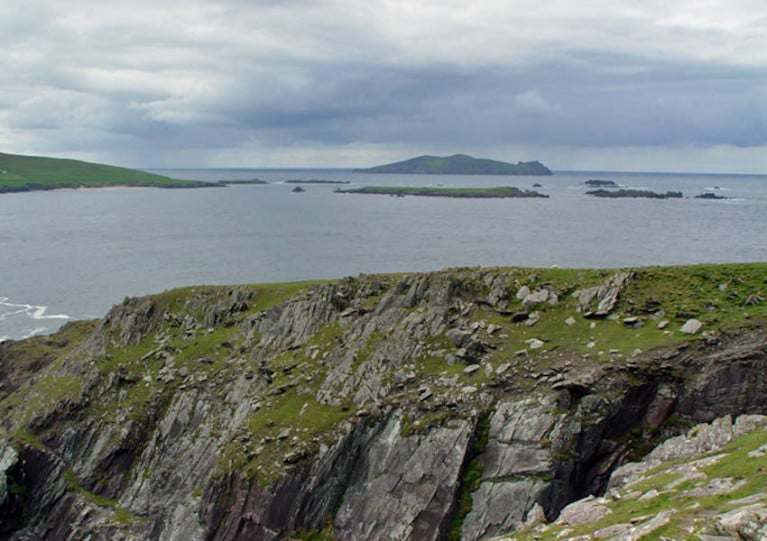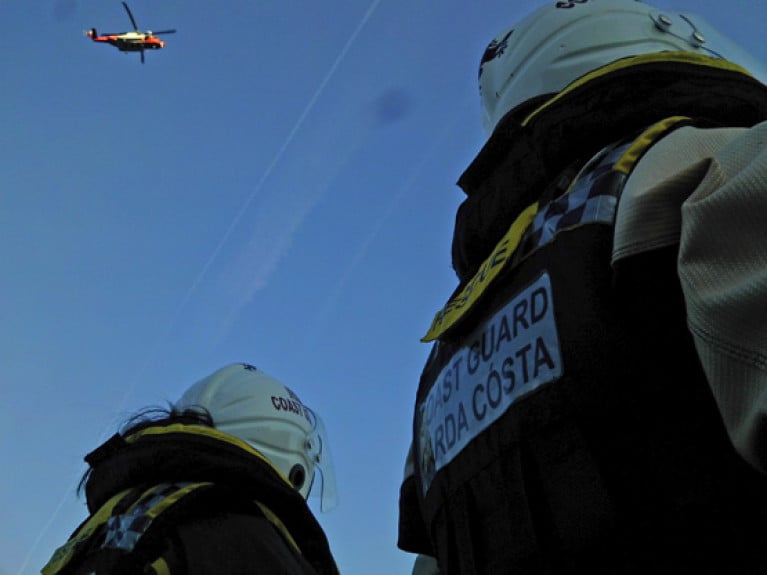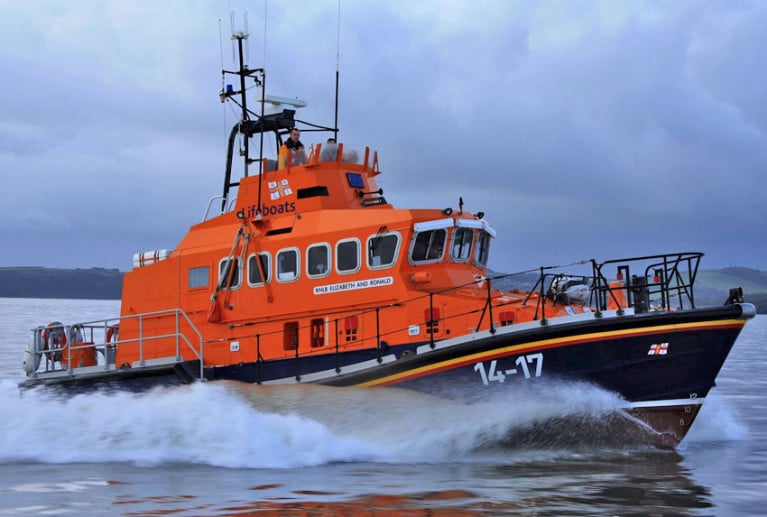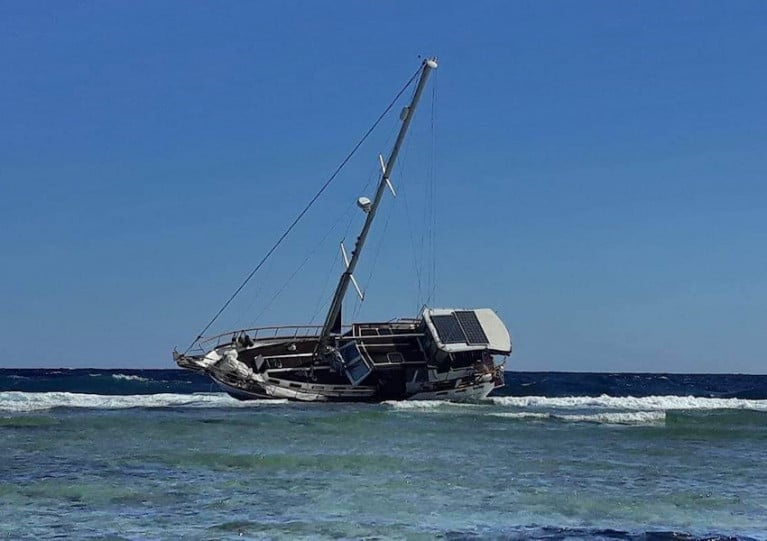Displaying items by tag: missing
The search for a fisherman missing after a small fishing vessel with two on board sank off the coast of Co Louth on Tuesday morning (12 December) has been called off for the night.
RTÉ News reports that a second fisherman was rescued after the incident north of Dunany Point in Dundalk Bay, and is being treated at Our Lady of Lourdes Hospital in Drogheda.
A multi-agency search and rescue operation was launched following at Mayday call at 8.45am from the fishermen’s vessel, with lifeboat and coastguard teams from Clogherhead and Greenore joining the Dublin-based Irish Coast Guard helicopter Rescue 116 at the scene.
Clogherhead RNLI says the search will resume on Wednesday morning (13 December), adding: “We are thinking of the family of the fisherman at this difficult time.”
Vessel Found in Search for Missing Cork-Bound Sailor as Family Appeal for Information
A vessel has been found in the search for a solo sailor who went missing last week while en route to West Cork.
However, there is still no sign of its skipper, whose family have issued an appeal for any information as to his whereabouts.
As the Irish Examiner reports, Duncan Lougee set out from Plymouth on Sunday 18 June on his 25-foot fibreglass Varne folkboat Minke, with the hull number FB597, as part of the 2023 Jester Baltimore Challenge.
Lougee, in his late 60s, was last seen on Monday 19 June near the Helford River in Cornwall. His yacht has both and EPRIB and a personal locator beacon and neither has been activated.
 Duncan Lougee’s 25-foot fibreglass Varne folkboat Minke
Duncan Lougee’s 25-foot fibreglass Varne folkboat Minke
The Irish Coast Guard have been assisting in the search for the missing yacht and sailor alongside HM Coastguard and RNLI lifeboat crews, as RTÉ News reports.
On Thursday afternoon (29 June), it reported that the Waterford-based coastguard helicopter Rescue 117 was tasked to a possible sighting of Minke some 75 miles southeast of Ballycotton in Co Cork.
The IRGC added: “A crew member from R117 boarded the vessel and conducted a visual check. Unfortunately the missing skipper was not onboard. R117 has departed the scene.
“As the vessel is positioned in the UK Search and Rescue Region, the UK authorities are continuing to coordinate the operation.”
A message on behalf of Lougee’s family on social media says “any information, no matter how seemingly insignificant, is desperately needed”.
Body Found on Holywood Beach Is That of Man Missing From Belfast-Bound Ferry
BBC News reports that the body of a man who went missing from a ferry in Belfast Lough late last month has been found.
Claims that a man had fallen overboard from a ferry on the night of Saturday 29 October prompted a multi-agency search of Belfast Lough that was stood down the following day.
Belfast Harbour Police have now confirmed that a body found on Thursday morning (17 November) on a beach in Holywood, Co Down is that of the missing ferry passenger.
As previously noted on Afloat.ie, the man was understood to be “a high-risk missing person” and had been on a crossing from Cairnryan in Scotland to Northern Ireland on the Stena Superfast VIII.
PSNI Recover Body of Missing Fermanagh Man From Lough Erne
The body of a man reported missing on Lough Erne last month has been recovered, as the Belfast Telegraph reports.
Michael McGirr of Co Fermanagh was last seen on Saturday 29 October on a boat heading in the direction of Inish Davar on Lower Lough Erne.
His boat was found empty the following day as a multi-agency search operation was under way.
On Saturday afternoon (12 November) a member of the McGirr family confirmed on social media that a body recovered from the lough by police was identified as Michael, and they thanked the community for their help.
Man Believed to Have Gone Overboard From Ferry in Belfast Lough is ‘High-Risk Missing Person’
A major search operation for a man believed to have gone overboard from a ferry in Belfast Lough at the weekend has been stood down and the matter handed over to police.
As the Belfast Telegraph reports, searches were suspended on Sunday (30 October) and a spokesperson for Belfast Harbour Police told the newspaper it is “engaged in an ongoing investigation into a high-risk missing person”.
It was reported in the Irish press that Dublin Port was contacted on Saturday evening by someone with concerns for their relative, a 39-year-old Limerick man who was expected on a ferry to the capital from Holyhead in Wales.
It later emerged that the man in question was on a crossing from Cairnryan in Scotland to Belfast on the Stena Superfast VIII.
Commenting on social media, Larne Search & Rescue — which was one of the many partners involved in the multi-agency response — said it was stood down on Sunday afternoon with nothing found.
“During the search, our dedicated volunteer crews were out in testing conditions in very little visibility,” it said. “Both lifeboats were deployed alongside Quayside teams and rotated through five crews during the long searches through the night and the following day.”
Larne Search & Rescue added: “It is very difficult for the team to not have a positive outcome, but…the area was extensively searched by all assets using various search patterns.
“Our thoughts are with the family at this time and we hope for positive news.”
French Solo Rower Lost at Sea After Distress Beacons Activated
A French adventurer who previously crossed the Atlantic in a barrel is missing and presumed dead at sea just weeks after beginning a solo crossing by row boat.
Jean-Jacques Savin, who was 75, had set out on 1 January from Sagres in Portugal for Martinique in the Caribbean on what was planned as a three-month voyage.
He was posting updates of his journey on Facebook and wrote last Wednesday (19 January) that despite strong winds and issues with his specialised row boat’s solar panels, he was “not in danger”, as BBC News reports.
But on Thursday (20 January) two distress beacons were activated from Savin’s position en route to the Azores, and the following day his vessel Audacieux was found overturned.
Despite earlier reports that Savin’s body had been found in his cabin, his daughter Manon confirmed on Sunday night (23 January) that his boat was found empty and a body was not recovered.
Body Recovered In Search For Missing Man On Dingle Peninsula
RTÉ News is reporting that a body has been found in the search for a missing man on the Dingle Peninsula.
As previously noted on Afloat.ie, was last seen early on Saturday, 20 June, and locals believed he may have got into difficulty while retrieving lobster pots from an inlet on Dún Mór Head in stormy seas.
Yesterday evening (Thursday 25 June), Mallow Search and Rescue recovered a body from the same deep inlet. A post-mortem was set for this morning and formal identification has yet to take place.
Elsewhere, an investigation is under way after partial human remains were discovered on the Donegal coast.
According to The Irish Times, the remains were found at Maghery, near Dungloe, yesterday evening and have been removed for post-mortem at Letterkenny University Hospital.
It follows the discovery earlier this year of a body part on a beach in Gweedore, some 25km from the scene of this incident.
An 11-year-old boy is believed to have sustained a broken leg when he and a friend fell from a sea cliff in North Co Dublin yesterday (Tuesday 23 June).
As Independent.ie reports, Irish Coast Guard rescue teams from Howth and Skerries were tasked to the scene by the Martello tower at Drumanagh in Rush as was the SAR helicopter Rescue 116.
A spokesperson for Dublin Coast Guard said one boy sustained a head injury but was “walking wounded”, while the other had a suspected broken femur and was winched to the care of ambulance staff for transfer to hospital.
"They were very lucky not to be more seriously injured," the spokesperson said.
Elsewhere, the search is ongoing for a man missing on the Dingle Peninsula in Co Kerry, as RTÉ News reports.
John Cunningham (53) was last seen early on Saturday, 20 June, and locals believe he may have got into difficulty while retrieving lobster pots from an inlet on Dún Mór Head in stormy seas.
Body Found In Search For Missing Fisherman Off Hook Head
A body has been found in the search for a fisherman missing after a fishing vessel sank off Hook Head earlier this month, as The Irish Times reports.
One man died when the trawler Alize went down off the Wexford coast while fishing for scallops. He was later named as Joe Sinnott (65) from Kilmore.
His fellow fisherman, Willie Whelan (41) from Fethard-on-Sea, has been missing since the incident on Saturday 4 January.
A diver from the Hook Head Sub Aqua Unit found a body yesterday morning (22 January) but it has yet to be formally identified.
The Irish Times has more on the story HERE.
Scottish Businessman Missing After Yacht Found On Red Sea Reef
The wife of a Scottish businessman has appealed for help in finding his whereabouts after his yacht was discovered empty during a 5,000-mile solo trip.
Colin Finnie (67) was last in contact with his family six days before his 45ft yacht Simba was found on Marsa Alam reef in the Red Sea on Friday 13 December, as International Boat Industry reports.
Finnie had been en route to Port Ghalib in Egypt, 350 miles from where his yacht was found abandoned, after setting out from Australia three months previously.
The wife of the retired engineer and former hotelier reportedly wrote on Facebook of her fears for Finnie, saying he was “in storms and low on fuel”.
IBI has more on the story HERE.

































































